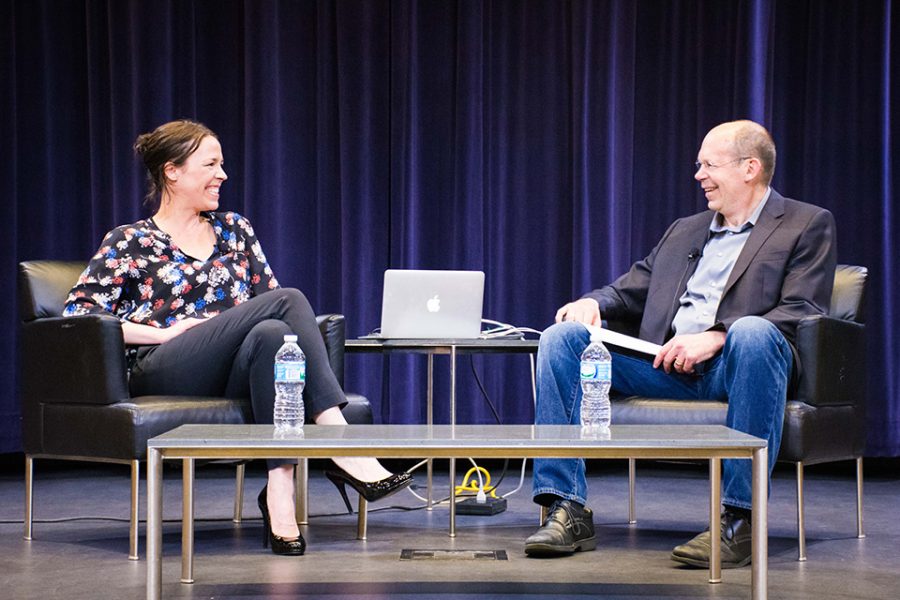‘Serial’ producer talks reporter’s role in storytelling
Sophie Mann/Daily Senior Staffer
Julie Snyder (left) sits down with Medill lecturer Alex Kotlowitz. The two spoke about Snyder’s experiences producing the podcasts “Serial” and “This American Life.”
May 3, 2016
Julie Snyder, the executive producer of “Serial” and senior producer at “This American Life,” discussed the processes behind the popular podcasts at an event Tuesday, focusing on the role a reporter should play in storytelling.
More than 150 people attended Snyder’s conversation with Medill lecturer Alex Kotlowitz at the McCormick Foundation Center Forum. Snyder said journalist Sarah Koenig, the host of “Serial,” excelled at making otherwise dry evidence, such as police reports and “pings” off cell-phone towers, interesting to listeners.
“In a lot of ways, she became the protagonist because she was doing the reinvestigation,” Snyder said. “This story lived in the details, and early on it was boring. We needed her to be telling us what these details mean.”
“Serial,” a non-fiction podcast, tells a reported story over the course of a season in week-by-week installments. Its first season casts doubt on the case against Adnan Syed, who was convicted of murdering his ex-girlfriend Hae Min Lee. Snyder is the show’s executive producer, which Kotlowitz said means she “quietly works her magic” behind the scenes and edits the show.
Snyder said Koenig’s ability to bring the listener into the reporting process — for example, by including audio of her driving around Baltimore chasing the story — made the information more digestible.
Kotlowitz said he enjoys this aspect of “Serial,” and that following the reporting process makes the podcast unique.
“One of the things I admire about ‘Serial’ is that it is very transparent about the reporter’s place in the story,” Kotlowitz told The Daily. “It doesn’t lecture. It doesn’t pander. It treats the audience with a substantial amount of respect and dignity.”
The second season followed Pfc. Bowe Bergdahl, a Taliban prisoner for nearly five years who was then charged by the U.S. military for deserting his post. Snyder said unlike the first season, Koenig was unable to develop a relationship with the main source because she could not interview Bergdahl directly.
“Because Adnan had a relationship with Sarah, he had more of an ability to use everything he had to try and win her over,” Snyder said. “We were very aware of the complicated nature of their relationship. I was very worried as the editor of the Bowe Bergdahl story because Bowe wasn’t going to have that chance with Sarah.”
But Snyder said after going through hours of a taped interview with Bergdahl, Koenig seemed to develop that connection, though in a different way than the one she had with Syed.
Medill graduate student Danielle Prieur said as a “Serial” listener, she felt Koenig’s reflections helped her navigate through the events.
“I liked her subjectivity instead of taking an objective view on the story,” Prieur told The Daily. “As reporters and journalists, we are human and we have opinions and some sort of relationship with sources, especially if you are working with them for over a year and a half.”
Snyder said her time at “This American Life” taught her the best stories are told organically and they show characters’ good and bad sides.
“I am most interested in producing the stories when the listener is just as intimate and involved in this person’s life as a friend would be,” Snyder said. “You’re trying to get people and all their three-dimensional-ness out there.”
Email: [email protected]
Twitter: @samkrevlin


